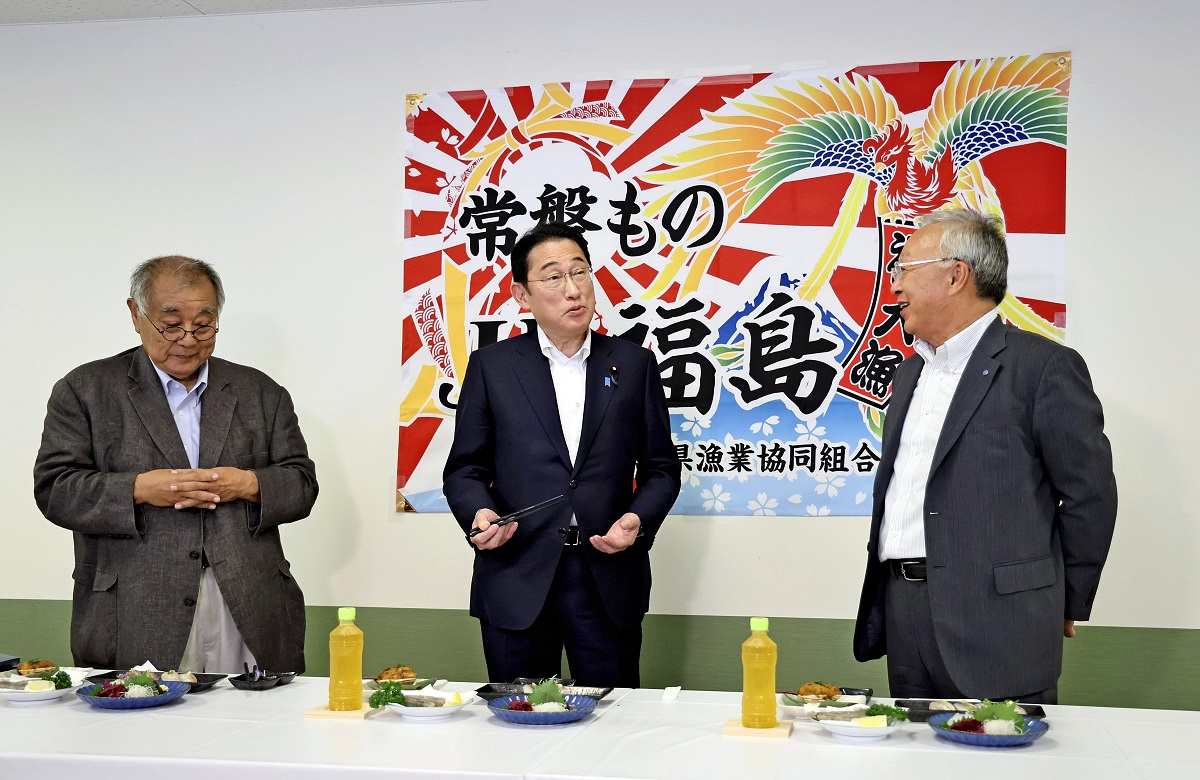Japan to urge China to Lift Seafood Import Restrictions; Touts Safety 1 Year After Release of Treated Water Began

Prime Minister Fumio Kishida samples seafood unloaded in Iwaki, Fukushima Prefecture, at the Onahama sea market on Saturday.
17:03 JST, August 25, 2024
The dispute over China’s suspension of seafood imports from Japan remains at an impasse, one year after the release of treated water from the Fukushima No. 1 nuclear power plant began.
Japan intends to continue searching for new markets for its marine products, to break away from its dependence on China. It will also urge China to lift the suspension by explaining its seafood’s safety based on scientific data.
Kishida visits Fukushima
Prime Minister Fumio Kishida visited a fish market in the city of Iwaki, Fukushima Prefecture, on Saturday, exactly one year after the release of the water started from the Tokyo Electric Power Company Holdings Inc. plant. Kishida sampled bonito, sea urchin and other seafood unloaded in the city and touted their safety.
“We’ll continue taking necessary measures so that fishermen can continue their work with peace of mind,” Kishida said as he exchanged opinions with the head of the Fukushima Prefectural Federation of Fisheries Co-operative Associations.
Kishida promised continued assistance to fishermen, to minimize the impact of China’s suspension on sales in the fisheries industry, including those of fishermen and processed seafood manufacturers nationwide.
According to a survey by the Agriculture, Forestry and Fisheries Ministry, exports of Japan’s agriculture, forestry and fisheries products and food items from January to June 2024 were valued at ¥701.3 billion. This was down 1.8% from the same period a year before the first decline in four years.
The drop is mainly attributed to lower exports to China, which declined 43.8% from a year ago.
Shipments of scallops were strongly affected. Before the start of the treated water’s release, more than half of Japan’s scallop exports went to China. In many cases, scallops with shells were exported from Japan to China, which then reexported them to the United States after processing.
In an effort to protect Japan’s fisheries industry, the government compiled a package of policy measures worth ¥100.7 billion in September last year and has been taking steps to boost domestic consumption and diversify overseas markets.
In the same month, the Japan External Trade Organization (JETRO) set up an emergency headquarters at the government’s request. It has so far set up more than 1,400 business meetings between foreign buyers and Japan’s fisheries and processed seafood businesses. This helped a U.S. major seafood wholesaler to buy Japan-produced scallops.
Thanks to such efforts, Japan’s scallop exports to the United States in the first half of this year rose 64.1% from a year before. Exports to Canada were 7.2 times higher, while those to Vietnam were 7.9 times higher and those to Thailand were 3.5 times higher.
“[The government’s package of policy measures] helped explore alternative sales routes for half the amount [of fisheries products] previously exported to China. It’s been steadily proving effective,” Kishida told reporters after his visit to the Iwaki fish market on Saturday.
However, Kishida also said the amount has yet to fully supplement the lost demand. He indicated that he will shortly hold a meeting of related Cabinet members to consider additional assistance measures.
Change in China’s stance
As long as China continues its import restrictions, it will be difficult for the Japanese fisheries industry to break the impasse. Japan will keep calling on the Chinese government to understand the safety of the release process under the monitoring system that involves the International Atomic Energy Agency, and to steadily urge China to remove the restrictions.
Japan and China are far apart in their positions. The Chinese government calls the treated water “nuclear-contaminated water” and is demanding to conduct sampling tests by itself. This year, however, China began attending talks between experts from the two countries over the treated water. Prime Minister Fumio Kishida requested the talks when he met with Chinese President Xi Jinping at a summit meeting last November.
The move apparently comes against the backdrop of a slowdown in China’s domestic economy. To attract Japanese investment, it is essential for China to improve its ties with Japan, but that will be hard as long as China continues its restrictions on Japan’s seafood.
“I assume China is looking for where to lower its fists,” a high-ranking Japanese government official said.
Xi plans to attend the Group of 20 summit set to be held in Brazil in November. The Japanese government is exploring the possibility of a meeting between Xi and Kishida’s successor as prime minister, in an effort to find a solution.
Top Articles in Politics
-

Japan PM Takaichi’s Cabinet Resigns en Masse
-

Sanae Takaichi Elected Prime Minister of Japan; Keeps All Cabinet Appointees from Previous Term
-

Japan’s Govt to Submit Road Map for Growth Strategy in March, PM Takaichi to Announce in Upcoming Policy Speech
-

LDP Wins Historic Landslide Victory
-

LDP Wins Landslide Victory, Secures Single-party Majority; Ruling Coalition with JIP Poised to Secure Over 300 seats (UPDATE 1)
JN ACCESS RANKING
-

Producer Behind Pop Group XG Arrested for Cocaine Possession
-

Japan PM Takaichi’s Cabinet Resigns en Masse
-

Man Infected with Measles Reportedly Dined at Restaurant in Tokyo Station
-

Israeli Ambassador to Japan Speaks about Japan’s Role in the Reconstruction of Gaza
-

Videos Plagiarized, Reposted with False Subtitles Claiming ‘Ryukyu Belongs to China’; Anti-China False Information Also Posted in Japan





















